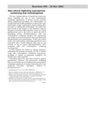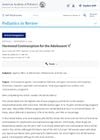 30 citations,
October 2014 in “Journal of The American Academy of Dermatology”
30 citations,
October 2014 in “Journal of The American Academy of Dermatology” A team approach is crucial for managing PCOS, with dermatologists playing a key role.
May 2021 in “Journal of the Endocrine Society” Adolescents with PCOS have higher levels of certain androgens, which are linked to hair growth but don't help diagnose PCOS better than testosterone levels.
 April 2021 in “Interciencia médica”
April 2021 in “Interciencia médica” PCOS is a common condition in women that causes various symptoms and health issues, treatable with lifestyle changes and medication.
 46 citations,
January 2007 in “The European Journal of Contraception & Reproductive Health Care”
46 citations,
January 2007 in “The European Journal of Contraception & Reproductive Health Care” Birth control pills increase the risk of blood clots, especially within the first year and with certain types.
 5 citations,
May 2017 in “Current Opinion in Pediatrics”
5 citations,
May 2017 in “Current Opinion in Pediatrics” Hormonal therapies are safe and effective for treating acne in female adolescents, with specific treatments for those with endocrine disorders.
 22 citations,
March 2018 in “American Journal of Clinical Dermatology”
22 citations,
March 2018 in “American Journal of Clinical Dermatology” Hormonal antiandrogen therapy for acne is underused and can reduce the need for antibiotics.
 48 citations,
May 2012 in “Journal of Midwifery & Women's Health”
48 citations,
May 2012 in “Journal of Midwifery & Women's Health” Polycystic Ovary Syndrome is common but often undiagnosed, and early treatment is important to prevent health problems.
 25 citations,
December 2017 in “The Journal of Clinical Endocrinology & Metabolism”
25 citations,
December 2017 in “The Journal of Clinical Endocrinology & Metabolism” Birth control pills combined with bicalutamide are more effective at reducing excessive hair growth in women with PCOS than birth control pills alone.

A young woman with kidney failure had hair loss due to a common hormonal disorder, which improved with hormone therapy.
 29 citations,
March 2017 in “International Journal of Women's Dermatology”
29 citations,
March 2017 in “International Journal of Women's Dermatology” Hormone therapies like birth control pills and spironolactone are safe and effective for treating women's adult acne.

PCOS is a common hormonal disorder with symptoms like irregular periods and excess hair growth, managed with lifestyle changes and medications.
 November 2023 in “L'Endocrinologo”
November 2023 in “L'Endocrinologo” Women with PCOS are more likely to experience sexual dysfunction, but lifestyle changes and weight loss can improve sexual function.
 46 citations,
September 2016 in “Clinical, Cosmetic and Investigational Dermatology”
46 citations,
September 2016 in “Clinical, Cosmetic and Investigational Dermatology” Hormonal treatments are effective for severe or persistent acne and should be used with other acne therapies, considering potential side effects.
 May 2019 in “Paediatrics and child health”
May 2019 in “Paediatrics and child health” The document concludes that personalized treatment, including lifestyle changes and medication, is essential for managing PCOS in teenagers, while also addressing their psychological well-being.
26 citations,
July 2012 in “Journal of family planning and reproductive health care” The document says that hirsutism in women usually needs hair removal and hormone treatment to manage symptoms and improve well-being.
 31 citations,
June 2015 in “British Journal of Dermatology”
31 citations,
June 2015 in “British Journal of Dermatology” Hormonal treatments are effective as a second-line option for moderate-to-severe acne in females, but should be used with caution due to health risks.
January 2021 in “Voprosy ginekologii akušerstva i perinatologii” Effective management of hyperandrogenism in young women requires accurate diagnosis and tailored treatment.
 34 citations,
October 2018 in “Journal of The American Academy of Dermatology”
34 citations,
October 2018 in “Journal of The American Academy of Dermatology” Hormone treatments can help with women's skin and hair disorders, but they need careful monitoring and more research.
February 2025 in “Journal of Neonatal Surgery” Non-surgical treatments can significantly reduce keloids in children, with combination therapies being safer and more effective.
 52 citations,
June 1999 in “Endocrinology and Metabolism Clinics of North America”
52 citations,
June 1999 in “Endocrinology and Metabolism Clinics of North America” Antiandrogen treatments combined with oral contraceptives can help manage hair growth and hair loss in women with PCOS.
17 citations,
January 2004 in “European journal of obstetrics, gynecology, and reproductive biology/European journal of obstetrics & gynecology and reproductive biology” Certain hormone medications can treat symptoms like acne and unwanted hair, regulate periods, and prevent pregnancy in women and teenage girls.
 26 citations,
March 2014 in “Arquivos Brasileiros De Endocrinologia E Metabologia”
26 citations,
March 2014 in “Arquivos Brasileiros De Endocrinologia E Metabologia” The document concludes that proper diagnosis and combined treatments are key for hirsutism management, and weight loss may help overweight patients.
7 citations,
May 2014 in “Iranian Red Crescent medical journal” Laser hair removal is effective for hirsutism when combined with treatment for the underlying causes.
 March 2002 in “Reactions Weekly”
March 2002 in “Reactions Weekly” Some birth control pills increase blood clot risk; use them for specific conditions only.
 November 2008 in “Pediatrics in Review”
November 2008 in “Pediatrics in Review” Hormonal birth control pills are commonly used by teens but often fail due to incorrect use.
 3 citations,
January 1985 in “PubMed”
3 citations,
January 1985 in “PubMed” Hormonal birth control can cause skin issues, but low-dose options and those with antiandrogens may reduce these effects.
1 citations,
January 2007 in “Humana Press eBooks” Effective treatments for excessive body hair in women include drugs that block androgens, sometimes combined with oral contraceptives.
 37 citations,
February 2007 in “Clinical Obstetrics and Gynecology”
37 citations,
February 2007 in “Clinical Obstetrics and Gynecology” The document concludes that treating PCOS requires a combination of drugs to manage reproductive and metabolic symptoms, with more research needed on combination therapies.
 March 2006 in “Archives of Dermatology”
March 2006 in “Archives of Dermatology” Topical steroids help Erosive Lichen Planus, finasteride with birth control aids Female Pattern Hair Loss, young age helps Occupational Hand Eczema prognosis, quitting smoking is key for Diffuse Dermal Angiomatosis, and a 3-site Botulinum Toxin A injection is effective for glabellar wrinkles.
 44 citations,
June 1985 in “Fertility and sterility”
44 citations,
June 1985 in “Fertility and sterility” Combination drug therapy is effective for hirsutism that doesn't improve with just one medication.























